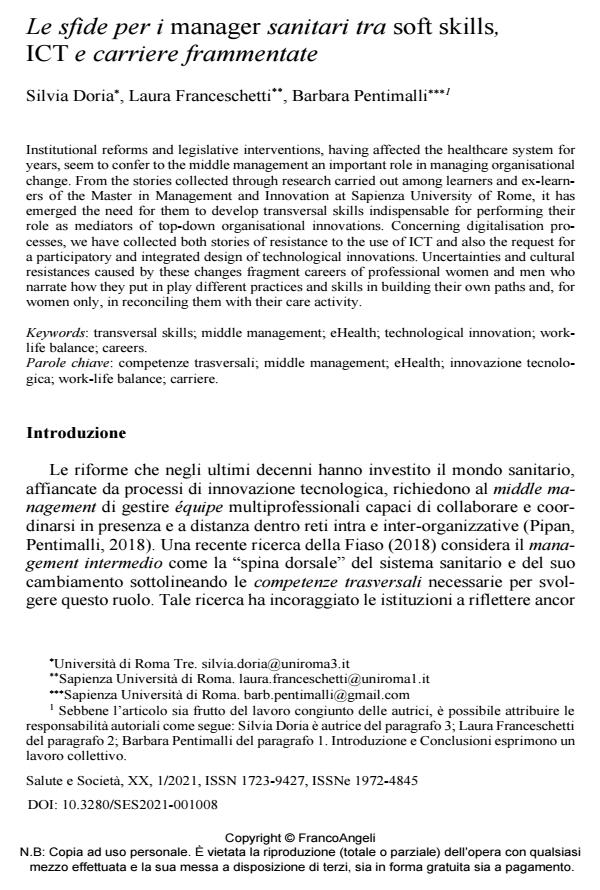Le sfide per i manager sanitari tra soft skills, ICT e carriere frammentate
Journal title SALUTE E SOCIETÀ
Author/s Silvia Doria, Laura Franceschetti, Barbara Pentimalli
Publishing Year 2021 Issue 2021/1
Language Italian Pages 17 P. 101-117 File size 469 KB
DOI 10.3280/SES2021-001008
DOI is like a bar code for intellectual property: to have more infomation
click here
Below, you can see the article first page
If you want to buy this article in PDF format, you can do it, following the instructions to buy download credits

FrancoAngeli is member of Publishers International Linking Association, Inc (PILA), a not-for-profit association which run the CrossRef service enabling links to and from online scholarly content.
Institutional reforms and legislative interventions, having affected the healthcare system for years, seem to confer to the middle management an important role in managing organisational change. From the stories collected through research carried out among learners and ex-learners of the Master in Management and Innovation at Sapienza University of Rome, it has emerged the need for them to develop transversal skills indispensable for performing their role as medi-ators of top-down organisational innovations. Concerning digitalisation processes, we have collected both stories of resistance to the use of ICT and also the request for a participatory and integrated design of technological innovations. Uncertainties and cultural resistances caused by these changes fragment careers of professional women and men who narrate how they put in play different practices and skills in building their own paths and, for women only, in reconciling them with their care activity.
Keywords: Transversal skills; middle management; eHealth; technological innovation; work-life balance; careers.
- Lavorare agile, lavorare da remoto: che genere di conciliazione? Silvia Doria, in SOCIOLOGIA DEL LAVORO 159/2021 pp.217
DOI: 10.3280/SL2021-159011 - Trust, but verify.. Power relations and control practices in a smart working environment Silvia Doria, in STUDI ORGANIZZATIVI 1/2021 pp.24
DOI: 10.3280/SO2021-001002
Silvia Doria, Laura Franceschetti, Barbara Pentimalli, Le sfide per i manager sanitari tra soft skills, ICT e carriere frammentate in "SALUTE E SOCIETÀ" 1/2021, pp 101-117, DOI: 10.3280/SES2021-001008